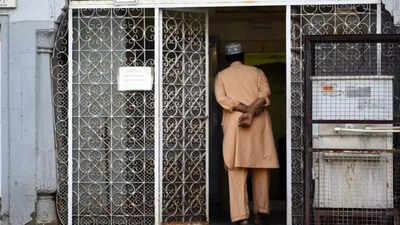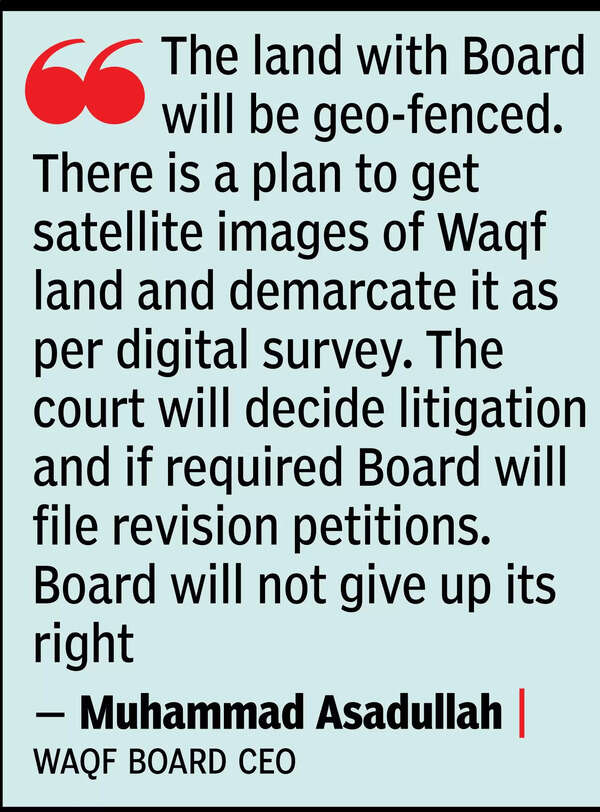
HYDERABAD: With over 75% of its properties encroached upon over the decades, Telangana Waqf Board has been fighting over 3,500 cases to claim about 55,000 acres worth thousands of crores.
The land parcels involved in legal wrangles, ranging from a few square yards to hundreds of acres, are located across the state, especially in Rangareddy, Medchal-Malkajgiri, Mahabubnagar, Sangareddy, and Nizamabad districts.
Waqf Board claims it owns over 77,000 acres across the state. However, only 22,000 acres were litigation free.

For instance, the Board has been claiming nearly 1,200 acres in Aloor village in Chevella mandal, 90 acres in Guttala Begumpet near Madhapur, 108 acres in Manikonda, 350 acres in Malkajgiri mandal, 350 acres in Rajendranagar, 530 acres in Medak district, and 560 acres in Maheshwaram mandal. The Board is also fighting with the forest department over ownership of 1,700 acres. Of the 4,000 acres near Pahadisharief, nearly 2,000 acres of waqf land was allotted to the Shamshabad airport by the then AP govt, and the Board was s now left with less than 100 acres, the Board officials stated.
Board members say litigations on Waqf land were mainly for two reasons. First, the revenue department did not mutate land being claimed by the Board in the revenue records, and the land went into the hands of squatters in some districts. The other reason is inordinate delay in issuing gazette notification even after surveys and verification by the govt. Most gazette notifications pertaining to the Waqf properties began in the early 1990s and were issued and published until 2000.
Dismissing claims that the Waqf Board has been issuing notifications claiming ownership of the land recently, the Board officials claim the basis for claiming the land was a survey done in 1961 itself. Gazette notifications got delayed due to technical reasons. The Waqf Board has been writing letters to collectors to mutate its land parcels and also stop registering the Waqf land to others since 2015, but they were ignored by authorities.
Minority leaders worried about ‘Waqf by User’ clause
For instance, 350 acres in Malkajgiri and an equal parcel of land in Rajendranagar near Agriculture University belong to Mir Momin Sahab ki Pahadi, and the claim was proved 60 years ago. Similarly, for about 1,200 acres of land being claimed by the Board in Aloor village, there were ‘muntakhabs’ (a certificate of grant) by the Nizam, a Waqf Board member revealed.
Explaining the reasons, Waqf Board sources said, as per the Act, the collectors were supposed to amend the revenue records within six months after the survey report was sent by the govt.
Giving an example of the extent of damage for not recording the Waqf land in revenue records, an officer said the then AP govt handed over 1,950 acres in Manikonda to APIIC, which auctioned it to several infra and multinational companies.
“The Waqf land was identified six decades ago. The AP govt had appointed a survey commissioner in 1961 to survey the Waqf land. The survey details were vetted and ratified by the govt. Even in 1995, the amendment said the properties, which were already declared as Waqf prior to 1995, were deemed to be Waqf, and no further inquiry, ratification, and reconsideration was required, and the same was reiterated in 2013 also,” a senior Telangana Waqf Board official said.
Concerns over amendment by Centre
If the new Waqf (Amendment) Bill 2024 is passed in the Parliament session, officials said a situation might arise where the Waqf Board has to prove ownership of its land to collectors. Minority leaders worry about the clause ‘Waqf by User’, where properties such as ‘masjid’, ‘ashurkhanas’, ‘kabristan (Muslim graveyard), and ‘dargahs’ do not have any documents. The Waqf Board officials have submitted their concerns and objections to the proposed amendment to the Waqf Board to the parliamentary committee.
However, the Telangana Waqf Board officials claim, though many amendments were made to the Waqf Act, especially in 1995 and in 2013 by Parliament, the Centre clarified that “once a property is declared as Waqf, it shall remain Waqf, and it cannot be altered”.







